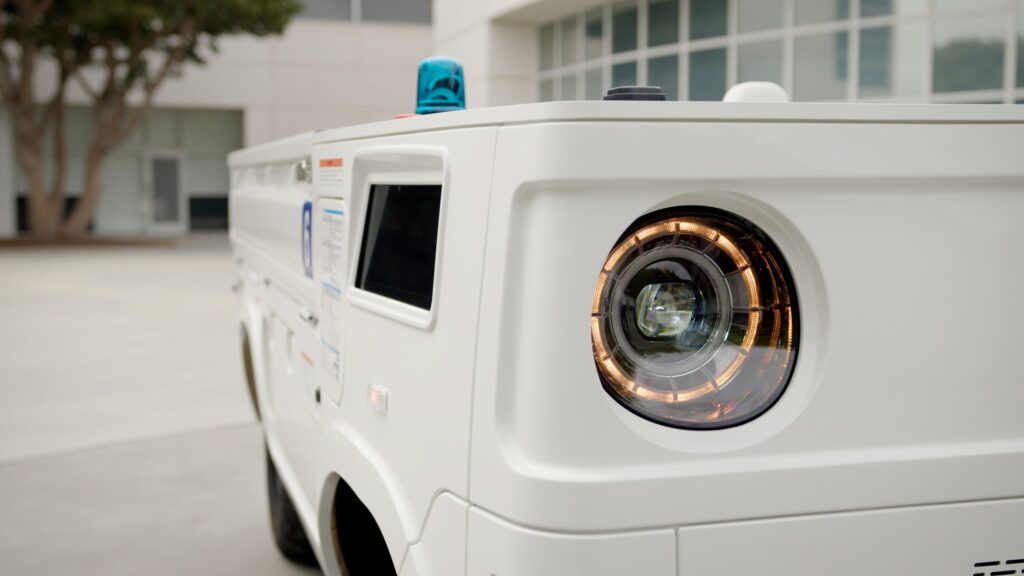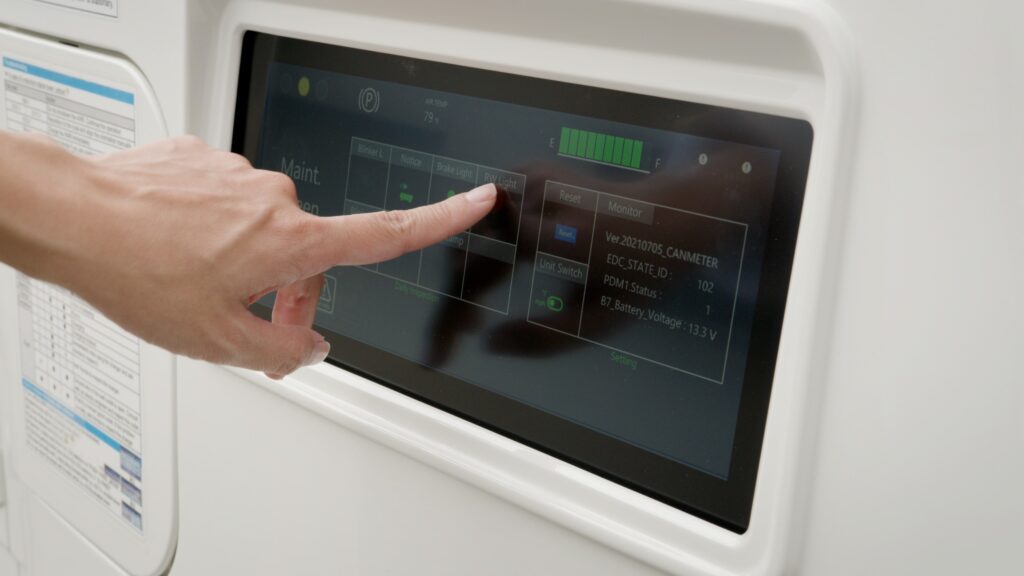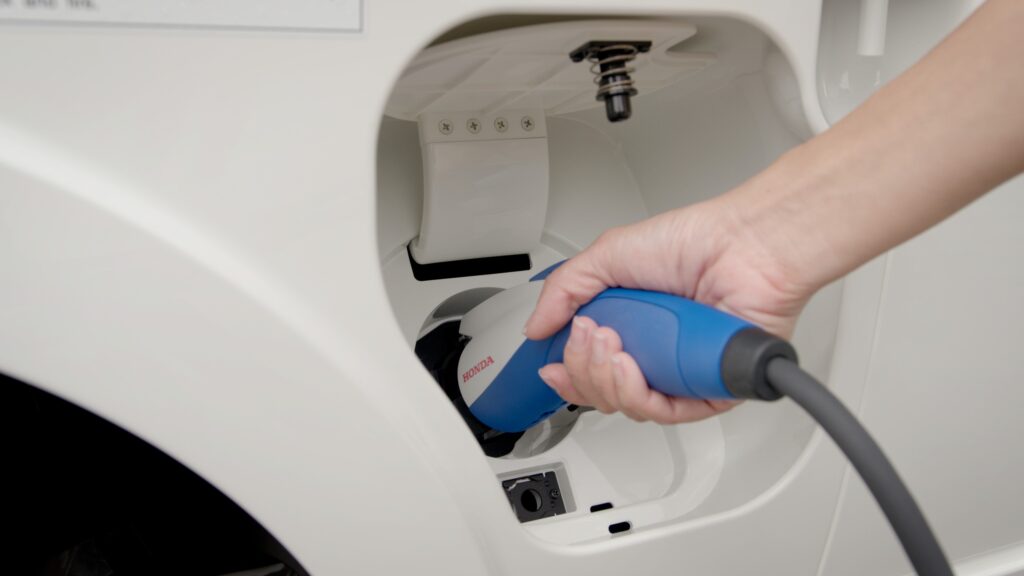Honda Tests its Autonomous Work Vehicle at a construction site.
- Prototype of the second generation Honda Autonomous Work Vehicles (AWV) effectively completed a variety of tasks at a large-scale solar energy construction site.
- The Honda AWVs were operated by Black & Veatch, who proved their performance and adaptability in a variety of construction scenarios.
- The Honda AWV is expected to be capable of a wide range of tasks for sectors that require a tough off-road autonomous solution.
November 15, 2021 — TORRANCE, CA, and OVERLAND PARK, KS – At a Black & Veatch construction site in New Mexico, Honda and Black & Veatch successfully tested the prototype Honda Autonomous Work Vehicle (AWV). The second-generation prototype of the fully-electric Honda AWV performed a variety of tasks at a large-scale solar energy construction project during the month-long field test, including towing and transporting construction materials, water, and other supplies to pre-determined locations within the worksite.

While Honda had previously conducted field testing with an earlier iteration of the Honda AWV, this was the first time numerous units worked together to serve construction use cases. The Honda AWV blends the company’s rugged and durable off-road side-by-side platform with upcoming advanced autonomous technologies. It was first shown as a concept at CES 2018 in Las Vegas. As a result, a new class of capable work vehicle has emerged that can be used in a wide range of dynamic work situations. To drive autonomously, the Honda AWV uses a variety of sensors, including GPS for position, radar and lidar for obstacle detection, and stereoscopic (3D) cameras for remote monitoring. The vehicle can also be controlled remotely.
Black & Veatch, multinational engineering, procurement, and construction firm focusing on construction optimization and technological innovation, teamed up with Honda to provide a real-world testing environment for the Honda AWV technology at a live construction site. To properly employ the technology in the field, Honda engineers trained the company’s personnel on the operating and safety standards of the cars. Black & Veatch gave extensive comments on product and business requirements, which will allow the Honda AWV’s capabilities and services to improve.
“Black & Veatch’s pursuit of construction innovation and safety on job sites has led us to this relationship with Honda,” said Mario Azar, president of Black & Veatch’s global power business. “With our leading market position in solar power, the testing of this new autonomous work vehicle aligns with our focus on advancing the industry through new and innovative ways to work at project sites.”

“With our test partner, Black & Veatch, Honda was able to demonstrate the performance of our rugged all-electric Autonomous Work Vehicle prototype in a large-scale construction environment,” said Kenton Williams, U.S. project lead for the Honda AWV. “We believe the Honda AWV has the potential to bring greater efficiencies, higher levels of safety and better environmental performance to the construction industry, and to other industries seeking an autonomous off-road solution.”
Field Test Performance:
Honda chose a solar energy development site where support structures for solar panels are built out in a grid layout at regular intervals to evaluate the AWV’s capabilities. The location was suitable for testing the Honda AWV’s capacity to halt at precise points along a pre-determined route.
With the help of a cloud-based app interface that runs on tablets and PCs, Black & Veatch operators were able to precisely establish start and stop positions for various Honda AWVs around the 1,000-acre site. The cars successfully transported materials and supplies along a planned route and demonstrated their ability to halt within centimeters of pre-determined places.

The field test also demonstrated the viability of the Honda AWV battery system to support energy-intensive sensors and provide vehicle propulsion, while operating for up to eight hours in a high-temperature environment. The vehicle carried payloads of nearly 900 pounds, and in a separate use case towed a trailer carrying over 1,600 pounds.
Solutions and Services for a Variety of Industries:
Based on the capabilities demonstrated in this field test, Honda expects the Honda AWV to be able to provide a wide range of services to a variety of industries that require a rugged off-road autonomous solution, particularly where workforce constraints and safety concerns make other options impractical. The Honda AWV is a viable platform for many industrial conditions because of its capacity to operate independently – or via remote control – and carry big payloads, as well as the ability to add attachments and tools.
Honda has not announced commercialization plans for the Honda AWV, but continues to advance the platform through field testing. Companies interested in testing the Honda AWV to assess applicability to their work environment can contact Honda at: AWV@na.honda.com.

Honda Autonomous Work Vehicle Gen 2 Prototype Specifications:
As the Honda AWV prototype’s development progresses, Honda expects additional advancements in performance and design characteristics.
| Vehicle dimensions | 9’ 6”L x 4’ 8”H x 4’ 11”W |
| Unladen vehicle weight | 721kg (1590lbs) |
| Maximum loading capacity | 399kg (880lbs) |
| Towing weight limit | 750kg (1653lbs) (including the weight of a trailer) |
| Minimum turning radius | 3.9m (12ft. 9.5in.) |
| Range at a maximum loading capacity | Up to 45km (27.9 miles) depending on the use case |
| Charge time | Up to 6 hours (120V) |

